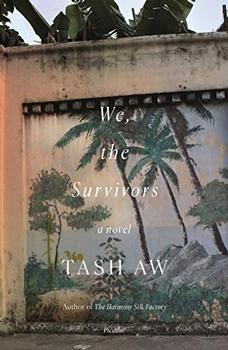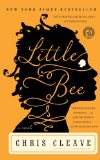Summary | Excerpt | Reviews | Beyond the book | Read-Alikes | Genres & Themes | Author Bio

A Novel
by Marina LewyckaFollowing the success of
A Short History of Tractors in Ukrainian,
Lewycka returns with a tragic-comic triumph of
cultural confusion which delves into the darkest
reaches of economic migration and Western
capitalism, encompassing the brutality of
factory-farming; the immigrant hostels that are
effective slums; the exploitation of illegal, and
even legal, workers, and the endless deductions
taken from their paltry paychecks for accommodation,
food, transport and 'training', that leaves them
with virtually nothing in their pockets; and then
there is the ultimately more sinister side of human
trafficking, which is not a major theme but raises
its ugly head from time to time (for more about
modern day slavery, see BookBrowse's review of
Unconfessed).
Half way through Strawberry Fields
(published in the UK as Two Caravans)
idealistic, freedom-loving Tomasz, a Polish migrant
worker in England, looks around the small stinking
room he shares with 5 strangers and wonders to
himself whether he is freer in the West today than
he was in Poland in the years of communism. In fact,
is he really any freer than the factory-farmed
chickens that it is his job to catch four at a time
and stuff into small cages so that they can be
packed into little plastic trays for 2-for-1
specials in the supermarket (a daily horror that
has already become routine to him)? "Tormentor and
tormented, they are all just damned creatures in
hell."
Strawberry Fields is full of people such as
Tomasz; migrant-workers from various parts of the
former Eastern Europe, and even further afield, from
Africa and Asia, who are drawn to seek work overseas
because of desperate conditions at home, only to
encounter more desperate conditions in the land of
opportunity.
The story opens in the strawberry fields of Kent in
the south of England, where Farmer Leaping runs a
profitable little business on the backs of a small
group of migrant workers, from Ukraine, Poland,
Africa, China and Malaysia, who pick his
strawberries. On his way to the fields on payday,
Leaping proudly runs through the calculations:
Pickers are paid 30p a kilo before deductions and
each kilo sells for £2; a good worker picks 80 kilos
(176 lbs) of strawberries a day, six days a week
over a twelve-week season. That's £144 a week
(~$290); but "the beauty of it is that half of what
you fork out in wages you can claw back in living
expenses" - each worker pays £50 per week rental for
their trailer bunk and £49 per week for food (white
bread supplemented by jam at breakfast, cheese
slices at lunch, and sausage for supper; and as many
strawberries as they can eat).
Farmer Leaping's views of his migrant workers, who
are all one and the same to him (except for Yola,
with whom he has a "special relationship") are
contrasted with first and third person accounts from
the strawberry-pickers themselves. Lewycka skips the
narrative between characters rapidly and skillfully,
giving everyone their moment in the spotlight, some
more than others; even a stray dog who attaches
himself to the group gets a say in punctuation-free
capitals that initially irritate but grow on the
reader as the book progresses.
The common link between the characters is that they
came to England with idealistic expectations but
their
backgrounds and education widely differ - nowhere more so than
between the two Ukrainians who emerge as central to
the story, and represent the two halves of one
country - Andrivy from the depressed mining town of
Donbas, and 19-year-old "high-spec" Irina, daughter
of a Ukrainian professor who arrives in England
expecting to meet "all the cultured, brave,
warm-hearted people that [she'd] read about in
Chaucer, Shakespeare and Dickens". She has been
warned by her mother to avoid "persons of minimum
culture" but has barely walked on English soil when
she falls into the grasp of odious Vulk, a
"mobilfon" thug with a fake leather jacket that
"creaked as he walked", who confiscates her passport
because "is many bed people in England. Can stealing
from you."
The reader might think life is tough in Farmer
Leaping's strawberry fields, but it is nothing
compared to what is to come for the group when they
leave the relatively green and pleasant lands of
Kent and embark on a journey that will take them to
places darker and more satanic than they could have
imagined. Strawberry Fields is an impossible
book to sum up - Lewycka plays with language and the
miscommunication between cultures as she bounces her
characters from slapstick to sitcom. They encounter
gangsters and guns, strawberries and more
strawberries, factory-farms and fishermen,
eco-warriors living in trees and social activists,
and even, briefly, Mr Mayevskyj (from A Short
History of Tractors in Ukrainian), along they
way they are cheated and defeated; but those who
emerge at the end do so a little wiser; as does the
reader.
Immigrant Workers in Britain
In defense of Britain, it should be noted that not
every immigrant in the UK experiences conditions as
described in Strawberry Fields. Like many
other Western European countries, especially those
who are members of the European Union (EU), Britain
has been overwhelmed by immigrants in recent years,
particularly since 2004 when ten additional
countries joined the EU, giving citizens of these
countries the right to work anywhere within the EU
(see sidebar). Many recent immigrants are getting on
very well, both as migrant workers doing an honest
days work for pay well in excess of what they could
earn at home; and also on a permanent basis -
building successful lives in Britain through a wide
variety of jobs, with the safety net of the British
social security system to support them (which is
second only to a few other countries in Northern
Europe). Others are earning a highly government
subsidized university education in the UK. However,
there are many others, some legal workers like
Tomasz, and an unknown number of others who work
illegally, who are not
so lucky.
![]() This review was originally published in The BookBrowse Review in October 2007, and has been updated for the
June 2008 edition.
Click here to go to this issue.
This review was originally published in The BookBrowse Review in October 2007, and has been updated for the
June 2008 edition.
Click here to go to this issue.

If you liked Strawberry Fields (Two Caravans), try these:

by Tash Aw
Published 2020
From the author of The Harmony Silk Factory and Five Star Billionaire, a compelling depiction of a man's act of violence, set against the backdrop of Asia in flux.

by Chris Cleave
Published 2010
The publishers "don't want to spoil" the story by giving too much away - so we won't - but in brief it features a young Nigerian orphan, a well-off British couple, and the real distances in a globalized world which can be crossed in single day. Published as The Other Hand in the UK, Australia and India; and Little Bee in the USA and Canada.
Your guide toexceptional books
BookBrowse seeks out and recommends the best in contemporary fiction and nonfiction—books that not only engage and entertain but also deepen our understanding of ourselves and the world around us.